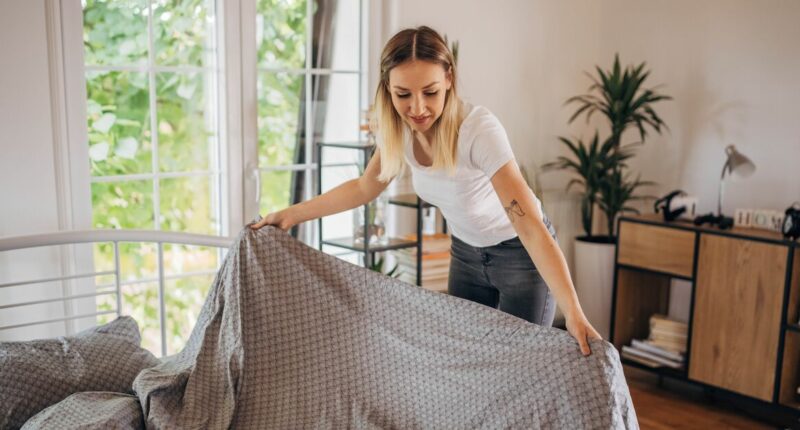Share this @internewscast.com
A microbiologist has revealed exactly how often we should be washing our bedding – with some items in need of cleaning more frequently than you might realise. According to the expert, we shed “hundreds of thousands of skin cells” every night, exposing our beds to millions of bacteria and fungi.
Writing for The Conversation, Primrose Freestone, a senior lecturer in clinical microbiology, University of Leicester, stressed the importance of regular bedding washing. And this isn’t just because of dead skin and bacteria.
She explained: “Each night, as we sleep, we shed hundreds of thousands of skin cells, excrete oils from our sebaceous glands, and sweat up to half a pint of fluid – even if we’ve showered just before bed.
“Our skin hosts millions of bacteria and fungi, many of which are transferred onto sheets, pillows and duvets as we move during the night.
“That fresh sweat may be odourless, but bacteria on our skin, particularly staphylococci, break it down into smelly byproducts. This is often why you wake up with body odour, even if you went to bed clean.”
She explained that during the day, our hair and bodies collect pollutants, dust, pollen and allergens, which can also transfer to our bedding. “These can trigger allergies, affect breathing, and contribute to poor air quality in the bedroom,” she said.
On top of this, the flakes of skin we shed every night become food for dust mites. These are microscopic creatures that thrive in warm, damp bedding and mattresses.
“The mites themselves aren’t dangerous, but their faecal droppings are potent allergens that can aggravate eczema, asthma and allergic rhinitis,” she said. “Fungi also find your bed appealing. Some species, like aspergillus fumigatus, have been detected in used bed pillows and can cause serious lung infections, particularly in people with weakened immune systems.”
How often should you wash your bedding?
Primrose shared her advice on how and when you should be washing specific types of bedding.
Sheets and pillowcases
- Weekly, or every three to four days if you’ve been ill, sweat heavily, or share your bed with pets
- This is to remove sweat, oils, microbes, allergens and dead skin cells
- Wash at 60C or higher with detergent to kill bacteria and dust mites. For deeper sanitisation, tumble dry or iron
- To target dust mites inside pillows, freeze for at least eight hours
Mattresses
- Vacuum at least weekly and air the mattress every few days
- This is because sweat increases moisture levels, creating a breeding ground for mites
- She advised using a plastic or allergen-proof mattress protector and replace the mattress every seven years to maintain hygiene and support
Pillow interiors
- Wash them every four to six months (check the label first)
- This is because internal filling can harbour bacteria and mould
- Wash thoroughly and dry completely to avoid fungal growth
Blankets and duvet covers
- Wash these every two weeks, or more often if pets sleep on them
- This is because they trap skin cells, sweat and allergens
- Wash at 60C or as high as the care label allows. Some guidance recommends treating these like towels: regular and hot washes keep them hygienic
Duvets
- Wash these every three to four months, depending on usage and whether pets or children share your bed
- This is because even with a cover, body oils and mites eventually seep into the filling.
- Check the label: many duvets are machine-washable, others may require professional cleaning
Primrose added: “Your bed may look clean – but it’s teeming with microbes, allergens, mites and irritants that build up fast. Washing your bedding isn’t just about keeping things fresh; it’s a matter of health.
“Regular laundering removes the biological soup of sweat, skin, dust and microbes, which helps to reduce allergic reactions, prevent infections and keep odours at bay. And as research continues to show the profound effect of sleep on everything from heart health to mental clarity, a hygienic sleep environment is a small but powerful investment in your wellbeing.”
















